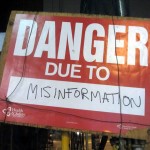 The Covid pandemic has underlined the harm caused by scientific misinformation online. While it may seem a natural response to want such misinformation censored, the Royal Society think relying on this is not the best way to tackle the spread of misinformation.
The Covid pandemic has underlined the harm caused by scientific misinformation online. While it may seem a natural response to want such misinformation censored, the Royal Society think relying on this is not the best way to tackle the spread of misinformation.
In a recent report, the UK’s national academy of science say that wide ranging measures are required to help society build up sufficient resilience against misinformation.
“The report reviews the challenges of misinformation and what steps we can take to deal with them,” the authors say. “It does not call for content removal as a panacea, rather it recommends a range of measures that governments, tech platforms and academic institutions can implement – recommendations that build resilience to misinformation and promote a healthy online environment.”
Societal harm
The authors highlight how scientific misinformation harms not just us as individuals but also society more broadly. As such, it is vital that its spread is checked. They explain that surveys reveal that people have a complex variety of reasons for sharing misinformation. What’s more, many are unlikely to be swayed by the provision of actual facts on the matter.
“Members of the public often lack the tools to tell authoritative sources from fictitious ones and tend to regard science as the absolute “truth” rather than a constantly evolving picture, and consequently fall victim both to honest mistakes and misreading of scientific results as well as intentional manipulation,” the authors continue.
Censoring information is not seen as the answer, however, as restricting access to information may simply confirm the worst suspicions of those who believe the various conspiracy theories abound online.
Instead, the report provides a number of recommendations for policymakers and social media platforms to help us better get to grips with the blight of misinformation:
- Supporting media plurality and independent fact-checking.
- Monitoring and mitigating evolving sources of scientific misinformation online.
- Investing in lifelong information literacy.